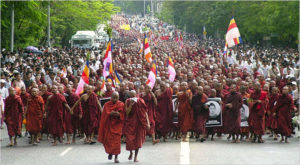 As the world bears witness to the litany of dictators and autocratic governments toppling or trying desperately to avoid doing so during the first half of 2011, the hot topic on the minds of students, scholars, and policymakers has often been which regime will be the next to go? After Zine al-Abidine Ben Ali and Hosni Mubarak fell to popular uprisings in Tunisia and Egypt respectively, the contagion of social discontent rapidly proliferated to neighboring Arab states; Libya quickly devolved into civil war, followed by protests in Yemen, Jordan, Bahrain, and Syria, each having been met with divaricating levels of repression by state security forces. One place that would seem suggestive to place a bet on as a target for where the next upheaval might materialize is Myanmar (Burma). Ruled for nearly half a century by a brutal military junta which routinely terrorizes its own citizens, why hasn’t Myanmar been caught up in the rising tide of democracy sweeping away despots in nation-states in precarious proximity to its own country?
As the world bears witness to the litany of dictators and autocratic governments toppling or trying desperately to avoid doing so during the first half of 2011, the hot topic on the minds of students, scholars, and policymakers has often been which regime will be the next to go? After Zine al-Abidine Ben Ali and Hosni Mubarak fell to popular uprisings in Tunisia and Egypt respectively, the contagion of social discontent rapidly proliferated to neighboring Arab states; Libya quickly devolved into civil war, followed by protests in Yemen, Jordan, Bahrain, and Syria, each having been met with divaricating levels of repression by state security forces. One place that would seem suggestive to place a bet on as a target for where the next upheaval might materialize is Myanmar (Burma). Ruled for nearly half a century by a brutal military junta which routinely terrorizes its own citizens, why hasn’t Myanmar been caught up in the rising tide of democracy sweeping away despots in nation-states in precarious proximity to its own country?
The answer, I believe, is trifurcated. Firstly, the historical record adduces that the junta is not apprehensive to use indiscriminate violence to quell dissent. Two instances in particular bear this assessment out. The “8888 Uprising,” which derives its title because of its beginning on the 8th of August, 1988, is the first example. The Socialist Party government of General Ne Win and his economic platform had rendered Burma as one of the poorest of countries in the world. The uprising began with demonstrations in the capital of Yangon (Rangoon) led by students, doctors, and Buddhist monks. It unceremoniously ended on the 18th of September with over 3,000 protestors dead. The second rebellion occurred in September 2007 when the junta’s decision to end fuel subsidies sent gas prices soaring. But while the junta’s fiscal policies may have served as an impetus to protests, the rallies in effect became a call for an end to the military regime and a popular annunciation for democracy. The peaceful demonstrations were viciously quelled after persisting for a month, resulting in dozens of dead and wounded citizens, international condemnation from the West, and increased sanctions against the military rulers.
Secondly, the junta has capitulated, albeit on a very minute scale, on several issues of importance to the Burmese pro-democracy movement. Aung San Suu Kyi, the political leader of the democracy movement, was finally freed after fifteen years of house arrest in 2010. Additionally, elections were held under dubious conditions in that same year. The Union Solidarity and Development Party, the political party used as a proxy by the junta, declared victory in what most independent observes declared a severely flawed electoral process which was boycotted by the main opposition, led by Suu Kyi. Nevertheless, such overtures would have been unconscionable for the junta just a few years prior.
Lastly, there must be some mention of the lack of internet access in Myanmar. Social media outlets like Facebook and Twitter were essential in mobilizing and organizing pro-democracy protests in the Middle East. But Burma’s population is not as well-educated and out of 60 million citizens, only approximately 400,000 use the internet. Cell phones are also not as prevalent in Myanmar as they are in other Southeast Asian states. Indeed, poor socioeconomic standing, in addition to institutional decay, combine to inhibit mobilization, as hypothesized eloquently by political scientist Sumit Ganguly in his work on the situation in Kashmir.
There is an argument to be made about mental drain and emotional exhaustion when it comes to organizing, to say nothing of the physical toll paid by protesters when the crackdown by the government takes a malevolent, often times violent turn. This may be why Burma watchers have not witnessed the type of palpable dissatisfaction and unrest in 2011 which was evident in the aforementioned Arab countries. It really is too bad because it seems the time is right as the U.S., under President Obama, is crafting a new grand strategy with respect to its hitherto cozy relationships with some of the world’s longest serving tyrants. The U.S. and several European governments have already hit some of Myanmar’s political leaders with sanctions, so human rights advocates can hold out some hope that the Burmese people will realize that the most advantageous time to reignite the vigor of their pro-democracy movement is right now.